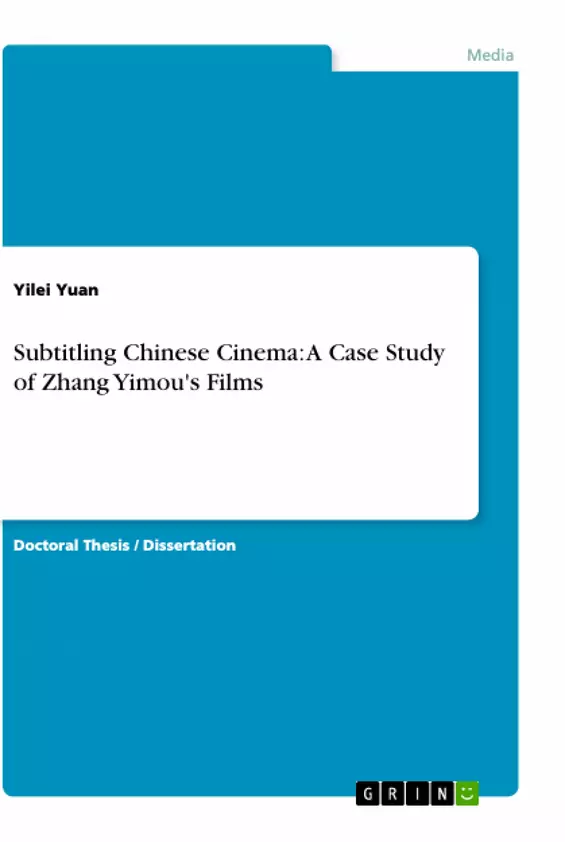In recent years, more and more Chinese films have been exported abroad. This thesis intends to explore the subtitling of Chinese cinema into English, with Zhang Yimou’s films as a case study. Zhang Yimou is arguably the most critically and internationally acclaimed Chinese filmmaker, who has experimented with a variety of genres of films. I argue that in the subtitling of his films, there is an obvious adoption of the domestication translation strategy that reduces or even omits Chinese cultural references. I try to discover what cultural categories or perspectives of China are prone to the domestication of translation and have formulated five categories: humour, politeness, dialect, history and songs and the Peking Opera. My methodology is that I compare the source Chinese dialogue lines with the existing English subtitles by providing literal translations of the source lines, and I will also give my alternative translations that tend to retain the source cultural references better. I also speculate that the domestication strategy is frequently employed by subtitlers possibly because the subtitlers assume the source cultural references are difficult for target language subtitle readers to comprehend, even if they are translated into a target language. However, subtitle readers are very likely to understand more than what the dialogue lines and the target language subtitles express, because films are multimodal entities and verbal information is not the only source of information for subtitle readers. The image and the sound are also significant sources of information for subtitle readers who are constantly involved in a dynamic film-watching experience. They are also expected to grasp visual and acoustic information. The complete omission or domestication of source cultural references might also affect their interpretation of the non-verbal cues. I also contemplate that the translation, which frequently domesticates the source culture carried out by a translator who is also a native speaker of the source language, is ‘submissive translation’.
Inhaltsverzeichnis (Table of Contents)
- Abstract
- List of Tables
- List of Figures
- Acknowledgements
- Author's Declaration
- Chapter One
- Introduction
- Chapter Two
- Literature Review
- Chapter Three
- Subtitling Humour: The English version of A Woman, a Gun and a Noodle Shop (Zhang Yimou, 2009)
- Chapter Four
- Politeness in Subtitling: To Retain or Not to
- Chapter Five
- Dialect in Subtitling: The Flowers of War (Zhang Yimou, 2011)
- Chapter Six
- Historical Subtitling: Archaisms and the Unstable Decades of Contemporary China
- Chapter Seven
- The Subtitling of Songs and the Peking Opera in Zhang Yimou's Films
Zielsetzung und Themenschwerpunkte (Objectives and Key Themes)
This thesis aims to explore the subtitling of Chinese cinema into English, using Zhang Yimou's films as a case study. It examines the adoption of the domestication translation strategy in subtitling, which reduces or omits Chinese cultural references. The thesis investigates which cultural categories are most prone to domestication, with a focus on humour, politeness, dialect, history, songs, and Peking Opera.
- Subtitling practices in Chinese cinema
- Domestication translation strategy in subtitling
- Cultural references in subtitling
- The impact of cultural references on subtitle readers' interpretation
- The role of multimodal communication in film
Zusammenfassung der Kapitel (Chapter Summaries)
Chapter One introduces the thesis and outlines its objectives. Chapter Two provides a literature review, examining previous research on subtitling, translation, and cultural references. Chapter Three focuses on the subtitling of humour in Zhang Yimou's film "A Woman, a Gun and a Noodle Shop," comparing source dialogue lines with existing English subtitles. Chapter Four examines politeness in subtitling, exploring the translation strategies used to retain or omit politeness markers. Chapter Five investigates dialect in subtitling through an analysis of "The Flowers of War," comparing the source Chinese dialogue with the English subtitles. Chapter Six discusses historical subtitling, exploring how archaisms and the unstable decades of contemporary China are translated. Chapter Seven examines the subtitling of songs and the Peking Opera in Zhang Yimou's films, analyzing how these elements are translated.
Schlüsselwörter (Keywords)
This study explores the subtitling of Chinese cinema into English, focusing on cultural references, domestication translation strategy, film semiotics, multimodal communication, and Zhang Yimou's films. It examines specific categories like humour, politeness, dialect, history, songs, and Peking Opera, and aims to understand the impact of translation on subtitle readers' comprehension and interpretation.
- Quote paper
- Yilei Yuan (Author), 2016, Subtitling Chinese Cinema: A Case Study of Zhang Yimou's Films, Munich, GRIN Verlag, https://www.grin.com/document/974177



